Europe
U.S. diplomat praises Germany policy towards Ukrainian refugees
Embassy Cultural Attaché Cherrie Daniels spoke with Blade on July 22
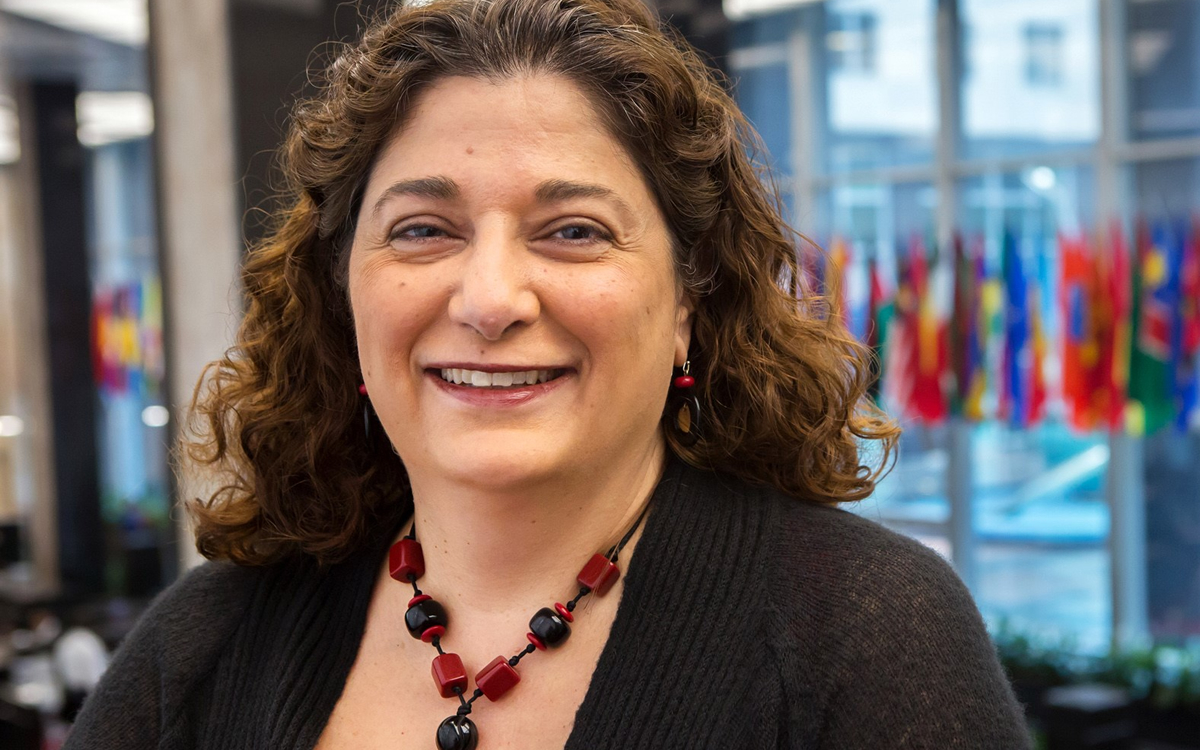
BERLIN — The cultural attaché at the U.S. Embassy in Germany has applauded the German government’s efforts to welcome Ukrainians who have sought refuge in the country.
“The German government and the municipalities and the 16 states have been extremely welcoming of Ukrainian refugees in Germany,” Cherrie Daniels told the Washington Blade on July 22 during a virtual interview from the embassy in Berlin.
More than 900,000 Ukrainians have arrived in Germany since the war began on Feb. 24.
Ukrainians are able to enter Germany without a visa.
Ukrainians, Russians, Iranians, Syrians, Algerians, Ghanaians and people from more than a dozen other countries attended a roundtable on LGBTQ and intersex refugees the embassy co-hosted with the Canadian Embassy in Germany on July 19. ORAM Executive Director Steve Roth and representatives of Germany’s Lesbian and Gay Association, Queer Refugees Deutschland, Human Rights Watch, Quarteera and Miles also participated.
“We can and must promote the protection of vulnerable LGBTQI+ refugees and asylum seekers,” said U.S. Ambassador to Germany Amy Gutmann. “These people are the most vulnerable of the vulnerable and we can and we must respond to human rights abuses. And we can and we must engage international organizations on the human rights of LGBTQI+ persons.”
Daniels said one of the issues roundtable participants discussed was “making sure that asylees get appropriate legal counseling before their asylum hearing.”
“Every country, including the United States and Germany, could do better,” she told the Blade.
Daniels added the roundtable’s overall goal was “to listen to what (participants’) challenges are in the countries they come from.”
“Our job is to listen to what those challenges are and see what our embassies in those regions or what the State Department at-large in the White House can do to support their additional inclusion and equal rights for them,” she said.
Daniels spoke with the Blade a day before Berlin’s annual Christopher Street Day parade took place.
The embassy, which is adjacent to Berlin’s Brandenburg Gate. was flying several Progress Pride flags in the days leading up to the parade. The canopy over the embassy’s main entrance was also adorned in rainbow colors.
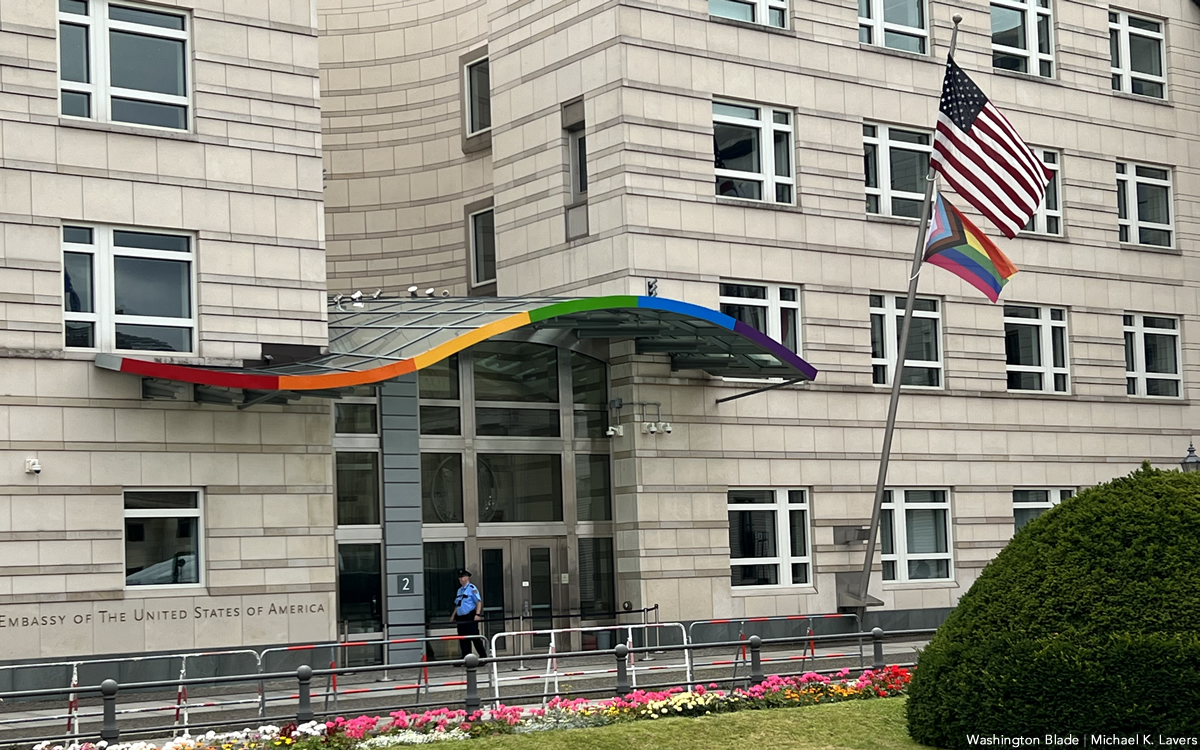
The embassy — along with the U.S. Consulates in Frankfurt, Düsseldorf, Leipzig, Hamburg and Munich — on July 6 hosted a discussion about LGBTQ and intersex issues in sports. Former Washington Spirit player Joanna Lohman, Portland Thorns coach Nadine Angerer and former German soccer player Marcus Urban participated.
Lohman is a lesbian, while Angerer and Urban are openly bisexual and gay respectively.
The embassy has also launched “UnterFreunden,” a podcast with an episode that highlights LGBTQ+ and intersex issues.
“What we wanted to assure is that we don’t only celebrate Pride during Pride Month, in June or July in Germany,” Jesse George, the embassy’s public diplomacy and media advisor, told the Blade during the interview with Daniels. “So we are amplifying and doing outreach regarding the LGBTQI+ community all year long.”
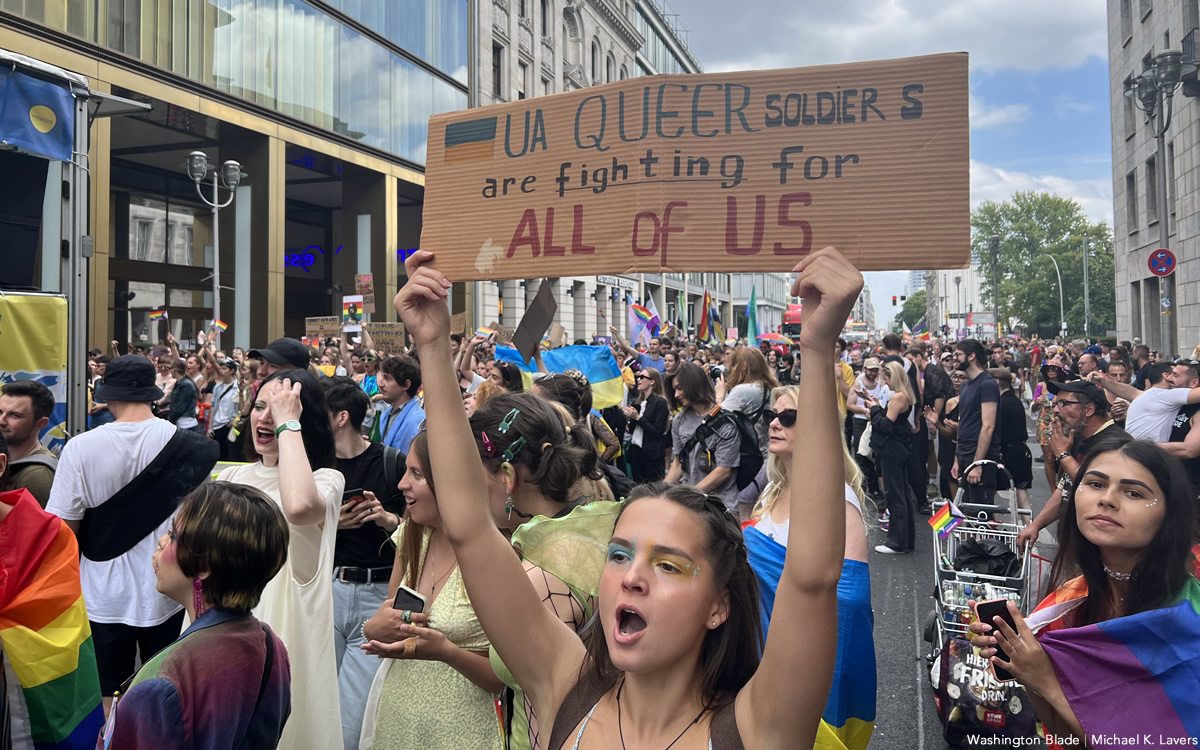
President Joe Biden in February 2021 signed a memo that committed the U.S. to promoting LGBTQ and intersex rights abroad as part of his administration’s overall foreign policy. The White House in the same year named Jessica Stern, who was previously the executive director of OutRight Action International, as the next special U.S. envoy for the promotion of LGBTQ and intersex rights abroad.
The State Department in April began to issue passports with “X” gender markers. Stern during an exclusive interview with the Blade ahead of Pride Month noted the Biden administration’s continued support of LGBTQ and intersex rights abroad also includes marriage equality in counties where activists say it is possible through legislative or judicial processes.
“When together we stand up for LGBTQI+ persons, we stand up for the work of building a country and a world where everyone belongs and everyone’s rights are respected, no matter who they are or who they love,” said Gutmann during the July 19 reception.
The U.S. Supreme Court on June 24 struck down Roe v. Wade.
Justice Clarence Thomas in his concurrent opinion said the Supreme Court should reconsider the decisions in the Obergefell and Lawrence cases that extended marriage equality to same-sex couples and the right to private, consensual sex.
The Respect for Marriage Act, which would codify marriage equality into federal law, passed in the U.S. House of Representatives last month with 47 Republicans voting in favor of it. The bill needs 60 votes in the U.S. Senate to overcome a potential filibuster.
Daniels said the Roe ruling is “definitely” on the minds of LGBTQ and intersex activists in Germany and “on our mind.”
“What we can do as an administration is to stand in solidarity with those marginalized communities and, of course, for women’s and girls’ rights and for reproductive rights globally,” she said. “That is something we can do as a State Department, as a foreign policy agency.”
Richard Grenell represented U.S. in Berlin from 2018-2020
Former U.S. Ambassador to Germany Richard Grenell, who is openly gay, represented the U.S. in Berlin from 2018-2020.
The previous administration tapped Grenell to lead an initiative that encourages countries to decriminalize consensual same-sex sexual relations. The Blade last August filed a lawsuit against the State Department in federal court in D.C. that seeks Grenell’s emails about the initiative.
The embassy during Grenell’s ambassadorship hosted a group of LGBTQ and intersex rights activists from around the world. Grenell and then-U.S. Ambassador to the U.N. Kelly Knight Craft in 2019 organized an event on the sidelines of a U.N. Security Council meeting that focused on decriminalization efforts around the world.
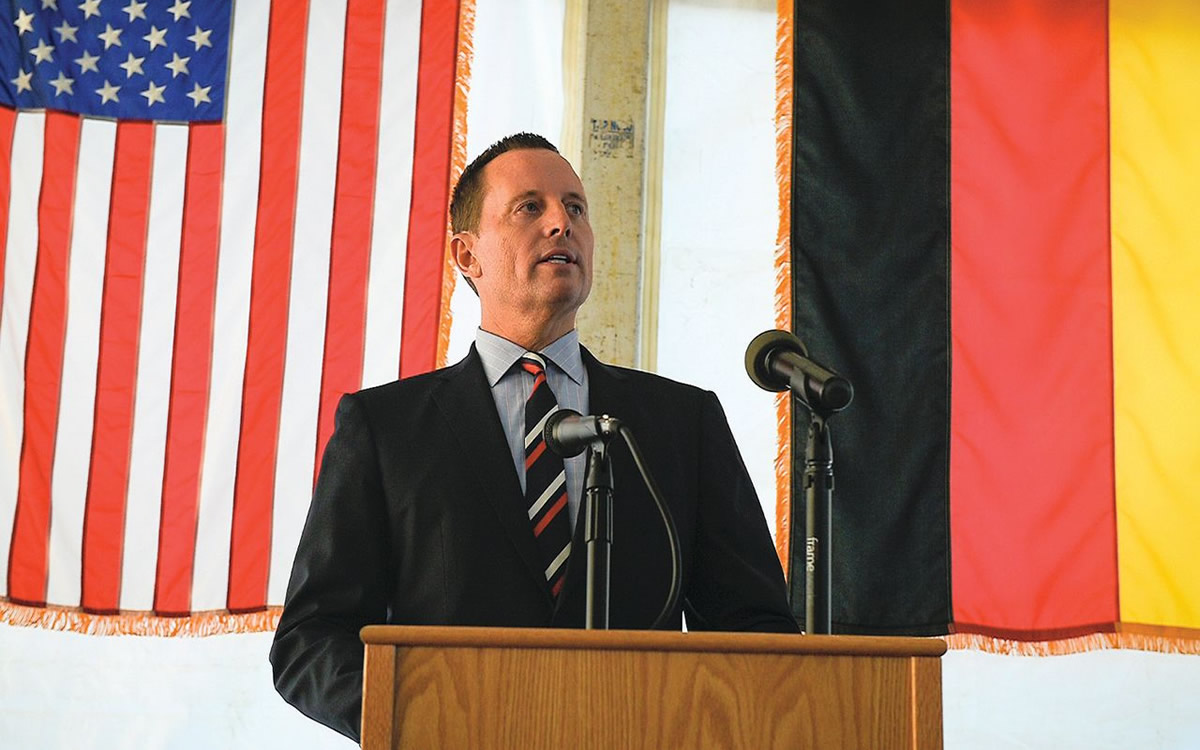
Grenell, among other things, faced condemnation from politicians in Germany who accused him of supporting far-right politicians and attempting to interfere in German politics. Advocacy groups in the U.S. and around the world also sharply criticized Grenell over his outspoken support of then-President Donald Trump.
Daniels did not specifically discuss Grenell during the interview. Daniels said in reference to the embassy’s work in support of LGBTQ and intersex rights that “people had been invited to the embassy in that period for certain public events.”
“Now having our doors wide open and showing this inclusive face of the United States, you know, I’ll let other people draw that contrast,” she said.
“In these four walls so to speak, we’re hearing, we’re listening and steering to the extent we can, sharing our policies and programs in a way that will address how can we improve that message of inclusion and of equal rights as LGBTQ rights or human rights,” added Daniels. “It’s not some niche issue. It’s mainstreamed into all of our policies.”
Daniels further stressed “that’s a difference that you’re going to see.”
“Again, it’s not flying the flag on Pride Month, although that’s wonderful,” she said. “It’s fighting for those rights, and all of our programs and all of our outreach and ensuring that that’s human rights. It’s not something that’s just for a particular, you know, trying to show that we do it. I think people can feel that inclusion when they’re in the company of this embassy.”
United Kingdom
UK Supreme Court rules legal definition of woman limited to ‘biological women’
Advocacy groups say decision is serious setback for transgender rights
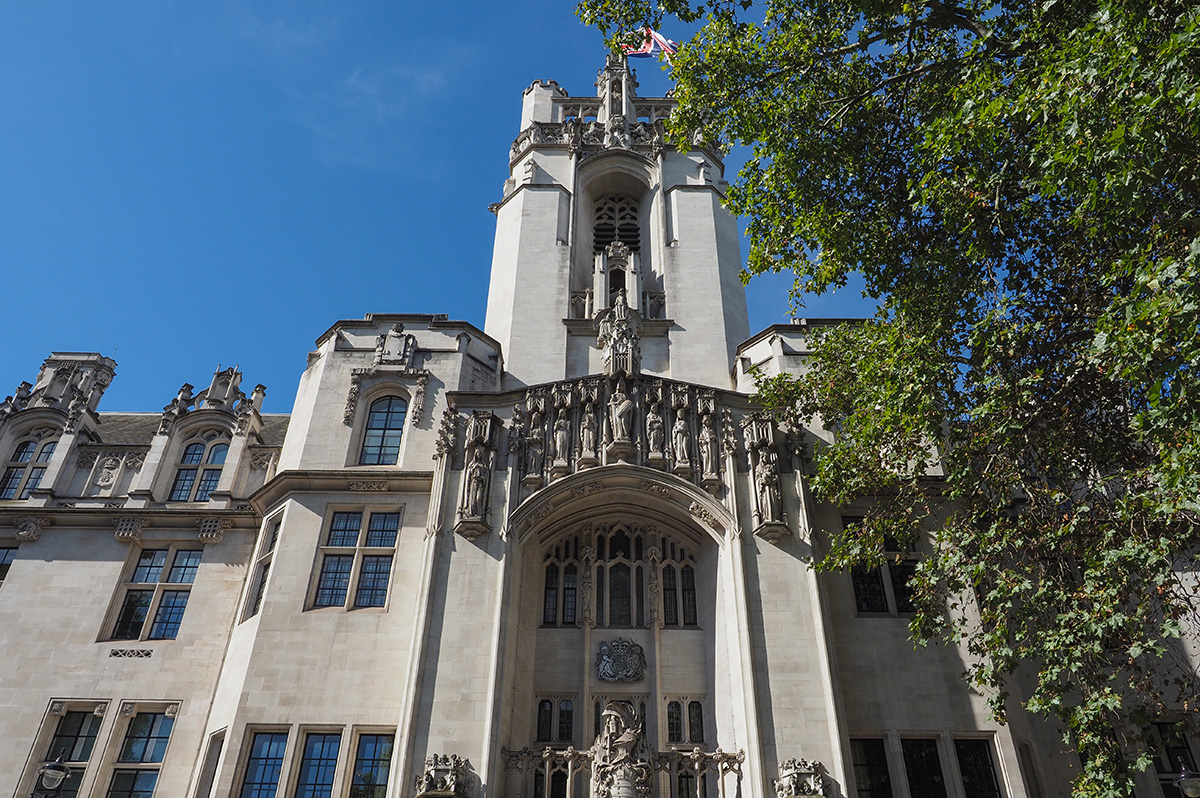
The British Supreme Court on Wednesday ruled the legal definition of a woman is limited to “biological women” and does not include transgender women.
The Equality Act that bans discrimination based on sexual orientation and gender identity took effect in 2010.
Scottish MPs in 2018 passed a bill that sought to increase the number of women on government boards. The Supreme Court ruling notes For Women Scotland — a “feminist voluntary organization which campaigns to strengthen women’s rights and children’s rights in Scotland” — challenged the Scottish government’s decision to include trans women with a Gender Recognition Certificate in its definition of women when it implemented the quota.
Stonewall U.K., a British advocacy group, notes a Gender Recognition Certificate is “a document that allows some trans men and trans women to have the right gender on their birth certificate.”
“We conclude that the guidance issued by the Scottish government is incorrect,” reads the Supreme Court ruling. “A person with a GRC (Gender Recognition Certificate) in the female gender does not come within the definition of ‘woman’ for the purposes of sex discrimination in section 11 of the EA (Equality Act) 2010. That in turn means that the definition of ‘woman’ in section 2 of the 2018 Act, which Scottish ministers accept must bear the same meaning as the term ‘woman’ in section 11 and section 212 of the EA 2010, is limited to biological women and does not include trans women with a GRC.”
The 88-page ruling says trans people “are protected by the indirect discrimination provisions” of the Equality Act, regardless of whether they have a Gender Recognition Certificate.
“Transgender people are also protected from indirect discrimination where they are put at a particular disadvantage which they share with members of their biological sex,” it adds.
Susan Smith, co-founder of For Women Scotland, praised the decision.
“Today the judges have said what we always believed to be the case, that women are protected by their biological sex,” she said, according to the BBC. “Sex is real and women can now feel safe that services and spaces designated for women are for women and we are enormously grateful to the Supreme Court for this ruling.”
Author J.K. Rowling on X said it “took three extraordinary, tenacious Scottish women with an army behind them to get this case heard by the Supreme Court.”
“In winning, they’ve protected the rights of women and girls across the UK,” she added.
It took three extraordinary, tenacious Scottish women with an army behind them to get this case heard by the Supreme Court and, in winning, they’ve protected the rights of women and girls across the UK. @ForWomenScot, I’m so proud to know you 🏴💜🏴💚🏴🤍🏴 https://t.co/JEvcScVVGS
— J.K. Rowling (@jk_rowling) April 16, 2025
Advocacy groups in Scotland and across the U.K. said the ruling is a serious setback for trans rights.
“We are really shocked by today’s Supreme Court decision — which reverses 20 years of understanding on how the law recognizes trans men and women with Gender Recognition Certificates,” said Scottish Trans and the Equality Network in a statement posted to Instagram. “The judgment seems to have totally missed what matters to trans people — that we are able to live our lives, and be recognized, in line with who we truly are.”
Consortium, a network of more than 700 LGBTQ and intersex rights groups from across the U.K., in their own statement said it is “deeply concerned at the widespread, harmful implications of today’s Supreme Court ruling.”
“As LGBT+ organizations across the country, we stand in solidarity with trans, intersex and nonbinary folk as we navigate from here,” said Consortium.
The Supreme Court said its decision can be appealed.
Hungary
Hungarian MPs amend constitution to ban public LGBTQ events
Viktor Orbán’s government spearheaded amendment

Hungarian MPs on Monday voted to amend their country’s constitution to ban public LGBTQ events.
The vote took place less than a month after lawmakers banned Pride events and gave authorities the green light to use facial recognition technology to identify those who participate in them.
The Associated Press notes MPs approved the constitutional amendment — which Prime Minister Viktor Orbán’s Fidesz-KDNP coalition government proposed — by a 140-21 vote margin. Authorities before the vote removed a group of protesters who tried to block the entrance to a parliament parking garage.
Orbán’s government over the last decade has moved to curtail LGBTQ and intersex rights in Hungary.
A law that bans legal recognition of transgender and intersex people took effect in 2020. Hungarian MPs that year also effectively banned same-sex couples from adopting children and defined marriage in the constitution as between a man and a woman.
An anti-LGBTQ propaganda law took effect in 2021. The European Commission sued Hungary, which is a member of the European Union, over it.
MPs in 2023 approved the “snitch on your gay neighbor” bill that would have allowed Hungarians to anonymously report same-sex couples who are raising children. The Budapest Metropolitan Government Office in 2023 fined Lira Konyv, the country’s second-largest bookstore chain, 12 million forints ($33,115.76), for selling copies of British author Alice Oseman’s “Heartstopper.”
Former U.S. Ambassador to Hungary David Pressman, who is gay, participated in the Budapest Pride march in 2024 and 2023. Pressman was also a vocal critic of Hungary’s anti-LGBTQ crackdown.
The Washington Blade has reached out to Budapest Pride for comment on the constitutional amendment.
Denmark
Denmark issues US travel advisory for transgender people
Federal government only recognizes two genders: Male and female

Denmark is the latest country to issue a travel advisory for transgender people who plan to visit the U.S.
“When applying for an ESTA (Electronic System for Travel Authorization) or visa to the United States, there are two gender designations to choose from: Male or female,” reads the travel advisory the Danish Foreign Affairs Ministry issued on Friday, according to the Associated Press. “If you have the gender designation ‘X’ in your passport, or you have changed your gender, it is recommended that you contact the U.S. Embassy prior to travel for guidance on how to proceed.”
President Donald Trump shortly after he took office on Jan. 20 issued an executive order that bans the State Department from issuing passports with “X” gender markers. Secretary of State Marco Rubio in response to directive ordered State Department personnel to “suspend any application requesting an ‘X’ sex marker and do not take any further action pending additional guidance from the department.”
Trump on Feb. 5 issued another executive order that bans trans women and girls from female sports teams. The Guardian reported Rubio later instructed American consular officials to deny visas in “cases where applicants are suspected of misrepresenting their purpose of travel or sex.”
The German government earlier this month issued a travel advisory for trans and nonbinary people who are planning to visit the U.S. The AP notes Finland followed suit.
WorldPride is scheduled to take place in D.C. from May 17-June 8.
InterPride, the organization that coordinates WorldPride events, on March 12 issued its own travel advisory for trans and nonbinary people who want to travel to the U.S.
“Due to an executive order issued by the U.S. president on Jan. 20, all travelers must select either ‘male’ or ‘female’ when applying for entry or visas. The gender listed at birth will be considered valid,” reads the advisory. “If your passport has ‘X’ as a gender marker or differs from your birth-assigned gender, we strongly recommend contacting the U.S. diplomatic mission before traveling to confirm entry requirements.”
The Capital Pride Alliance is the local WorldPride host. Capital Pride said it is working on the guide mentioned in the InterPride advisory.
The guide has yet to be released.
The African Human Rights Coalition, a group that promotes LGBTQ rights in Africa, last week called for a boycott of WorldPride, noting an “antagonistic fascist regime which presents distinct dangers to foreign LGBTQI+ attendees” now governs the U.S. Egale Canada, one of Canada’s largest LGBTQ advocacy organizations, in February announced its members will not attend WorldPride and any other event in the U.S. because of the Trump-Vance administration’s policies.
-

 District of Columbia4 days ago
District of Columbia4 days agoFinal push to raise funds, fill D.C. hotels as WorldPride nears
-

 El Salvador2 days ago
El Salvador2 days agoGay Venezuelan makeup artist remains in El Salvador mega prison
-

 District of Columbia4 days ago
District of Columbia4 days agoReenactment of 1965 gay rights protest at White House set for April 17
-

 Maryland4 days ago
Maryland4 days agoFreeState Justice: Transgender activist ‘hijacked’ Moore’s Transgender Day of Visibility event









